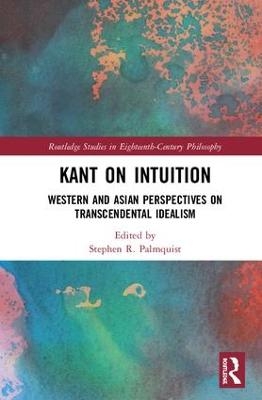
Kant on Intuition
Routledge (Verlag)
978-1-138-58924-7 (ISBN)
Kant on Intuition: Western and Asian Perspectives on Transcendental Idealism consists of 20 chapters, many of which feature engagements between Kant and various Asian philosophers. Key themes include the nature of human intuition (not only as theoretical—pure, sensible, and possibly intellectual—but also as relevant to Kant’s practical philosophy, aesthetics, the sublime, and even mysticism), the status of Kant’s idealism/realism, and Kant’s notion of an object. Roughly half of the chapters take a stance on the recent conceptualism/non-conceptualism debate. The chapters are organized into four parts, each with five chapters. Part I explores themes relating primarily to the early sections of Kant’s first Critique: three chapters focus mainly on Kant’s theory of the "forms of intuition" and/or "formal intuition", especially as illustrated by geometry, while two examine the broader role of intuition in transcendental idealism. Part II continues to examine themes from the Aesthetic but shifts the main focus to the Transcendental Analytic, where the key question challenging interpreters is to determine whether intuition (via sensibility) is ever capable of operating independently from conception (via understanding); each contributor offers a defense of either the conceptualist or the non-conceptualist readings of Kant’s text. Part III includes three chapters that explore the relevance of intuition to Kant’s theory of the sublime, followed by two that examine challenges that Asian philosophers have raised against Kant’s theory of intuition, particularly as it relates to our experience of the supersensible. Finally, Part IV concludes the book with five chapters that explore a range of resonances between Kant and various Asian philosophers and philosophical ideas.
Stephen R. Palmquist, Professor of Religion and Philosophy at Hong Kong Baptist University since 1987, has 190+ publications, including 100 refereed articles and book chapters. His 12 books include Kant’s System of Perspectives (1993), Kant’s Critical Religion (2000), Cultivating Personhood (2010), and Comprehensive Commentary on Kant’s Religion (2016).
Part I: The Role of Intuition in Geometry and Transcendental Idealism
1. How Does Transcendental Idealism Overcome the Scandal of Philosophy? Perspectives on Kant’s Objekt/Gegenstand Distinction Stephen R. Palmquist, Guy Lown, and Brandon Love
2. Kant, Euclid, and the Formal Intuition of Space Hoke Robinson and Dan Larkin
3. Geometrical Concepts and Formal Intuition Xing Nan
4. Pure Intuitions and Pure Forms of Intuition in the Transcendental Aesthetic and Elsewhere Gregg Osborne
5. Intuition and Existence: How Intuition Helps Construct and Disrupt Transcendental Idealism Jack Chun
Part II: The Function and Status of Intuition in Human Cognition
6. The Given in Theoretical and Practical Cognition: Intuition and the Moral Law Lucy Allais
7. Intuitions Under the Asymmetric Structure of the Subject–Object Relation: A Conceptualist Reading based on the B Deduction Xi Chen
8. Non-Conceptual Content of Intuition and Perception Jieyao Hu
9. Kant on Schematizing: Drawing the Line in Inner Intuition Sebastian Orlander
10. Negative Certainties: Nāgārjuna’s Challenge to Kant on the “Togetherness” of Intuition and Concepts Ellen Y. Zhang
Part III: The Sublime and the Challenge of the East on Intuiting the Supersensible
11. The "Sublime", the "Supersensible Substrate", and "Spirit": Intuitions of the Ultimate in Kant’s Third Critique John H. Zammito
Appendix to 11. Spirit and Sublimity, Pleasure and Freedom Robert R. Clewis
12. Kant’s Impure Sublime: Intuition, Comprehension, and Darstellung Bart Vandenabeele
13. Turn from Sensibility to Reason: Kant’s Concept of the Sublime Zhengmi Zhouhuang
14. The Ubiquity of Transcendental Apperception Werner Moskopp
15. Intuition as a Blend of Cognition and Consciousness: An Examination of the Philosophies of Kant and Krishnamurti Krishna Mani Pathak
Part IV: East-West Perspectives on the Role of Intuition in Philosophy
16. Philosophia in Sensu Cosmico: Kant’s Notion of Philosophy with Resonance from Chinese Antiquity Kwan Tze-wan
17. The Problem of Two-World Interpretation and Postmetaphysical Thinking: Mou Zongsan’s and Lao Sze-kwang’s Interpretation of Kant’s Philosophy Isaac Chun-yip Lowe
18. A Confucian Account of Intelligible Intuition in the Teachings of Liu Zongzhou Simon Sai-ming Wong
19. Kant’s Revolutionary Doctrine of Anschauung and the Philosophical Significance of Mencius’ "Original Mind" Suet Kwan Lo
20. The Paradox of Representation in Nishitani’s Critique of Kant Gregory S. Moss
| Erscheinungsdatum | 26.11.2018 |
|---|---|
| Reihe/Serie | Routledge Studies in Eighteenth-Century Philosophy |
| Zusatzinfo | 2 Tables, black and white; 2 Line drawings, black and white; 18 Halftones, black and white; 22 Illustrations, black and white |
| Verlagsort | London |
| Sprache | englisch |
| Maße | 152 x 229 mm |
| Gewicht | 592 g |
| Themenwelt | Geisteswissenschaften ► Philosophie ► Geschichte der Philosophie |
| Geisteswissenschaften ► Philosophie ► Philosophie der Neuzeit | |
| ISBN-10 | 1-138-58924-1 / 1138589241 |
| ISBN-13 | 978-1-138-58924-7 / 9781138589247 |
| Zustand | Neuware |
| Haben Sie eine Frage zum Produkt? |
aus dem Bereich


